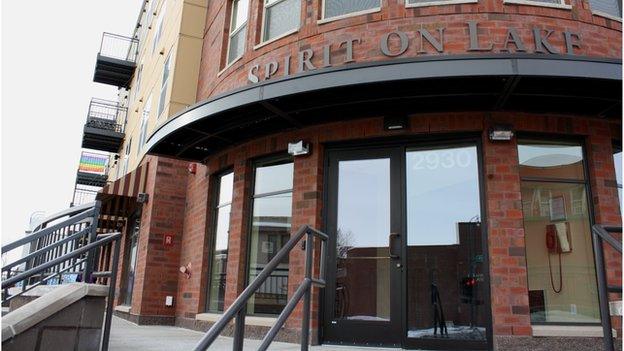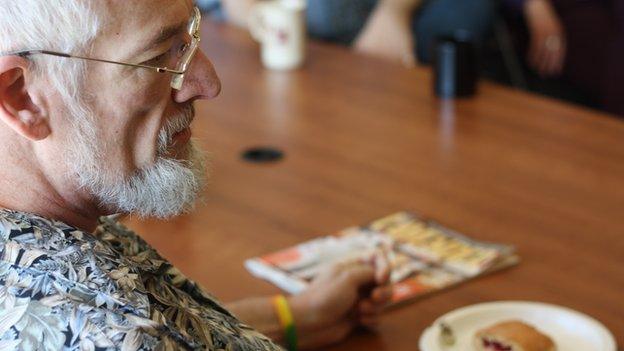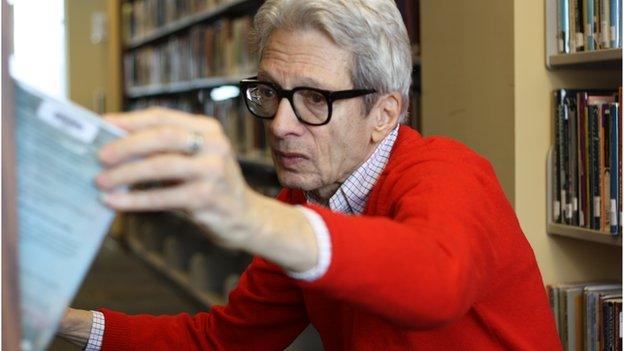The growth of gay retirement homes
- Published
The BBC visited Spirit on Lake, a housing development in Minneapolis that caters to the elderly lesbian, gay, bisexual and transgender (LGBT) community.
As gay rights advance across the US, there is one group that feels it has long been neglected and isolated - the elderly. But that may now be changing, with a series of retirement housing projects opening to serve the gay community.
Before she moved house, Lucretia Kirby suffered homophobic verbal harassment and menacing notes pushed under her door. On one occasion, she and her partner Sandra were physically beaten and had to seek treatment in hospital.
That all changed in October, when she got a place in Spirit on Lake, an apartment block in Minneapolis marketed to elderly lesbian, gay, bisexual and transgender (LGBT/GLBT) people.
"It's more than what I expected it to be. I thought it was just going to be another apartment complex and I was surprised that we've become a community - we know just about everybody by first name," says Kirby, a 58-year-old former teacher and nun who left her convent after falling in love with one of the other sisters. "I just feel blessed."
A number of commercial, market-rate projects succumbed to the financial crisis, but there are now three affordable or low-income housing developments that cater to gay retirees in the US. The first, Triangle Square, opened in Hollywood in 2007, shortly before the recession. Spirit on Lake eventually followed last year, and the John C Anderson apartments in Philadelphia received their first residents in January. Three other blocks are scheduled to open in Los Angeles, San Francisco and Chicago this year and next.
All have a combination of public and private funding, with subsidised, means-tested rental prices.
"I think it's taking off in a big way," says Gayle Gates of Gay and Lesbian Elder Housing in Los Angeles, which developed Triangle Square, "not only because people are beginning to see the need, especially for seniors, but because the baby-boomer generation is so large and ageing".
Many gay pensioners have a particular need for affordable housing. They usually have less family support than straight people and can find themselves at a financial disadvantage too - few or no spousal benefits, less help from children and possibly cut out from inheritance.
"They came of age in the United States at a time when they were heavily discriminated against," says Serena Worthington of the national non-profit group Services and Advocacy for GLBT Elders (SAGE). "It was illegal to be lesbian, gay, bisexual, you could be condemned by the church from the pulpit, you could be declared mentally ill, you could be fired."
Elderly gay people may still face prejudice living on their own or in other types of retirement housing - some return to the closet when they enter a residential home, fearful of telling other residents and staff about their past.
"If you think about the folks who supported a whole society that was extremely discriminatory, that is the population that is in the nursing homes now," says Worthington, citing the case, external of a lesbian couple in Oregon who were told they would have to pretend to be sisters if they moved into a retirement home.
The non-profit Equal Rights Center recently did tests across 10 US states and found that, external in 46% of cases, gay couples reported discrimination when seeking housing.

Spirit on Lake has 46 one and two-bedroom apartments
"I've lived in regular apartment buildings and it's like you don't really want to draw that much attention to yourself," says Scott Quail, another resident at Spirit on Lake. "You want to be gay but you don't want to be overtly gay. So in other apartment buildings you try to inhibit yourself.
While campaigners have focused on issues including gay marriage and rights in the workplace, the elderly LGBT community feel their concerns have often been ignored, external. That's especially true for gay men, says Quail. "It's a very ageist community. It's better to be young and pretty, and I'm not either."
But this may be changing, says Barbara Satin, a 79-year-old transgender activist who played a key role in launching of Spirit on Lake.
"This is an interesting time for the GLBT community because they're finally beginning to realise that age is something that presents some challenges."
Whereas the those already in their 70s or 80s may have lived in relative isolation, "the baby boomers have lived more openly and they expect to be treated with respect and they will push for it".
Ageing challenges include specific health concerns - HIV and, for the transgender community, taking hormones that may conflict with other medicine.

Coffee morning is among the social activities held at Spirit on Lake
Satin has been involved in a scheme to train local elderly care providers about gay issues. Fountaingrove Lodge, external, a high-end LGBT retirement home that opened in California in December, says it is the first with a license to provide continuing care such as dressing and bathing residents.
Gay retirement housing is also spreading beyond the US.
In November, the Regnbagen or Rainbow apartments, external, Europe's first solely gay retirement housing, opened in Stockholm. In Berlin, 24 flats run by the Gay Counselling Centre, external opened in 2012, with 60% of places reserved for gay men.
A Spanish foundation is hoping to open 40-50 flats near Madrid later this year, and a British developer is building a gated gay retirement village, external in southern France.
Christer Fallman, Regnbagen's chairman, says all 27 of his flats are occupied, and about 50 people are on the waiting list.
Though Sweden is widely regarded as progressive over gay rights, he says pensioners can face problems in public elderly care, where they are automatically assumed to be heterosexual.
"Elderly people want social security," he says. "They don't want to live alone - the possibility of going into the closet again is very big. They know that here they are not alone. Somebody always looks after them."
Living in such a tight-knit community is not for everyone. Larry Watson, a 76-year-old who volunteers at a LGBT library on the ground floor of the Spirit on Lake building, says he is quite happy living in a standard apartment building eight blocks away.

"I'm not lonely, I don't lack for activities, I haven't lost a partner fortunately," he says, adding that as gay rights continue to advance, he's not convinced that the demand for separate housing will be sustained.
"I think the course will remain very positive, and 15 or 20 years from now I'm not sure that GLBT are going to be looking for a niche similar to what's available and is wanted by GLBT people right now, as reflected by this community."
Satin says that in a survey conducted 10 years ago in the Twin Cities of Minneapolis and St Paul, about half of those who took part said they would want to live in a gay community in their old age.
In the Twin Cities there are an estimated 30-35,000 gay people aged over 65. With 46 apartments at Spirit on Lake, "we're not even scratching the surface", she says.
Under fair housing rules, the affordable or low-income projects that cater for gay people cannot exclude straight people outright, or they would not qualify for federal subsidies.
This can make for an interesting mix. In Triangle Square, 78% of residents are elderly and gay, but 11% are monolingual Russians. At Spirit on Lake, which unlike the other blocks has no minimum age requirement, the result is still more improbable - about three-quarters gay, and the rest Somali immigrants, many of them young.
That had some of the gay residents worried at first, but they say they now appreciate the diversity, and that there has been no friction.
Scott Quail tells a story of when he was in the lift with a man he was dating and they started to kiss.
"The elevator opened and in walked a couple of Somali ladies and they just kind of looked and smiled and that was it. And it felt good because now I feel I don't have to hide myself from them."
Video produced by Colm O'Molloy
Follow @BBCNewsMagazine, external on Twitter and on Facebook, external
- Published5 March 2014
- Published26 February 2014
- Published19 February 2014
- Published12 February 2014
- Published5 February 2014
- Published29 January 2014